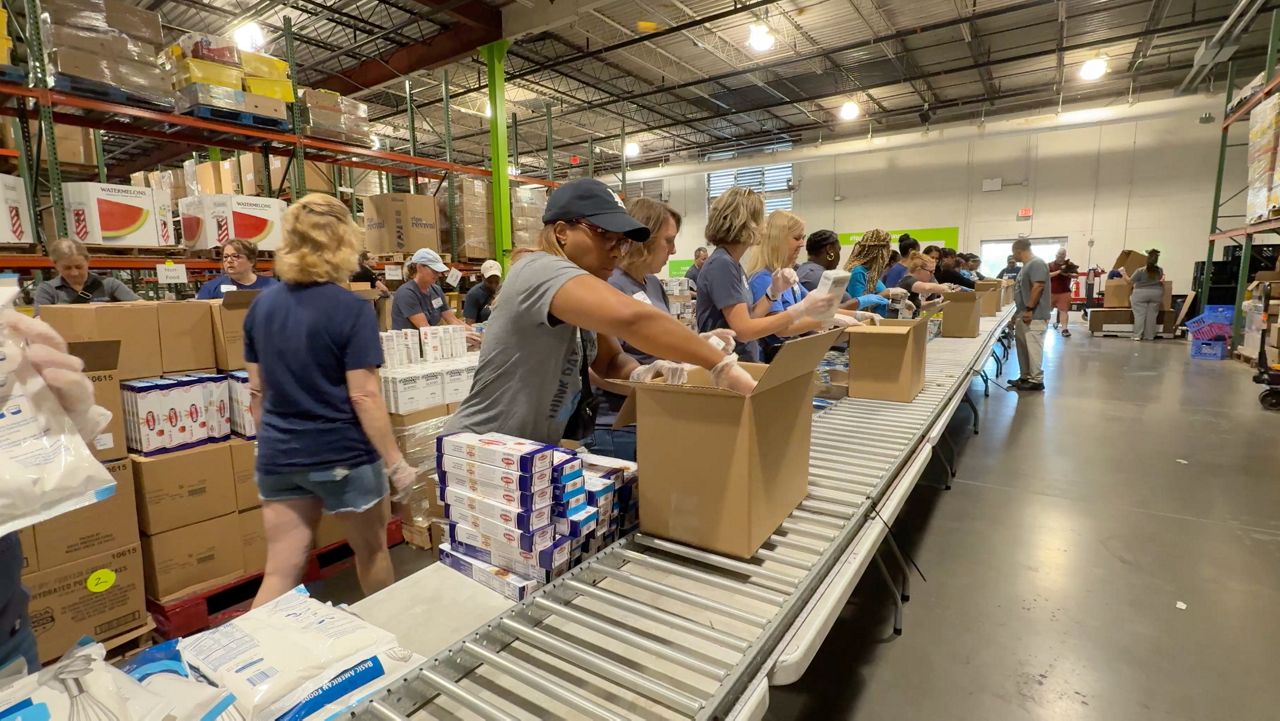Vermont
Vt. National Guard commander on burn pit benefits for Kosovo vets
/cloudfront-us-east-1.images.arcpublishing.com/gray/GDJBFP62RNH53IH56RDDBSUDI4.jpg)
BURLINGTON, Vt. (WCAX) – Many Vermont vets who served in Iraq and Afghanistan returned home to face a new fight.
For the last five years, WCAX has investigated burn pits in war zones — massive, open-air trash fires that burn around the clock and have been linked to rare forms of cancer among vets.
After years of fighting for coverage from the VA, the PACT Act took effect this year, granting veterans exposed to burn pits in war zones health care coverage and disability payments. Now, there’s a push to get vets who served in Kosovo, too.
Darren Perron spoke with Vermont National Guard Commander Maj. General Greg Knight about the efforts to get vets the help they need.
Vermont Sen. Peter Welch is joining other lawmakers in urging the VA to expand health care and disability benefits to those who served in Kosovo.
In a letter, the lawmakers are asking the Secretary of Veterans Affairs to bolster support for veterans stationed in the European country from 1999 on.
It’s an adjustment to the PACT Act which last year expanded resources to veterans exposed to burn pits, toxic chemicals and other hazardous substances during their deployment.
The lawmakers say they’re requesting the additional coverage because Vermont and New Hampshire National Guard soldiers have raised concerns.
Related Stories:
Welch pushes VA to expand health care coverage to Kosovo vets
Veterans exposed to toxins during service get help filing claims
Battle Over Burn Pits: Vet benefits finally on the way but fires still burning
Vermont Guard celebrates new law aiding veterans exposed to burn pits
Biden signs ‘burn pits’ help for veterans; a personal win, too
Vermont veterans’ widows grateful for signing of PACT Act
Senate approves bill to aid vets exposed to toxic burn pits
EXPLAINER: How health care for vets became fight in Congress
Burn pits legislation fails in Senate procedural vote
Burn pits legislation nears finish line with House approval
Wife of former Vt. general encouraged by Senate action on burn pits
Congress reaches deal on expanding burn pit benefits to vets
Welch continues push to help soldiers exposed to war zone burn pits
Biden pledges support to veterans exposed to burn pits
Battle Over Burn Pits: Vt. soldier in 1st-of-its-kind lawsuit dies of cancer
YCQM: May 23, 2021
Battle Over Burn Pits: 1st-of-its-kind lawsuit
Battle Over Burn Pits: New legislation could help vets exposed to toxic fumes
Will a new generation of Vt. soldiers face the Battle over Burn Pits?
Gillibrand enlists Jon Stewart on burn pit bill fight
WCAX News honored with national Edward R. Murrow Award
Gillibrand voices support for veterans exposed to burn pits
YCQM Nov. 24, 2019
Scott signs burn pit registry bill
Veterans lobby Vermont lawmakers for burn pit bill
Welch calls for action on burn pits
Supreme Court halts military burn pit appeals
Former Vt. Army National Guard Commander Michael Heston has died
Police officer gives back to sick kids after death
Perron, MacKenzie win national Murrow Award for burn pit series
WCAX wins Murrow Award for burn pit reports
St. Albans brewery gives ‘Tribute’ to former Guard member
Battle Over Burn Pits, Part 2
Battle Over Burn Pits, Part 1
Copyright 2023 WCAX. All rights reserved.

Vermont
Vermont murder suspect arrested in New York

PORTLAND, N.Y. (WCAX) – Police say the suspect in a Vermont murder was arrested in New York on Wednesday.
Terrence Biggs Jr., 25, of Michigan, was wanted in the deadly shooting of Austin Rodriguez, 26, of Rutland. It happened at a home on Summer Street on April 22.
Investigators say state police in New York arrested Biggs during a traffic stop in Portland, New York, that is in western New York, early Wednesday morning.
Biggs is charged with second-degree murder.
We still don’t know what authorities think led to the shooting or what the connection was between the two men.
Copyright 2025 WCAX. All rights reserved.
Vermont
Vermont shelter celebrates 68 adoptions in one month

Vermont
A covered bridge quest in Vermont – VTDigger


This story by Tim Calabro was first published in The Herald on Sept. 11, 2025.
Phill Gatenby rolled over the Moxley Bridge in Chelsea with a plastic skeleton riding shotgun in his Jeep, having made the long drive from Brattleboro for an early morning visit. Just a year ago, the Manchester, England native — by way of Florida — had never laid eyes on a covered bridge. Now he’s smitten.
Gatenby recalled seeing a covered bridge while driving around and thinking, “Oh, that’s interesting. I’d never seen a covered bridge in my life before. Never really heard of them,” he said. “A couple days later, I was going to Townshend, and all of a sudden it’s the Dummerston Bridge, and I’m just like, different size, different shape, different color.”
He stopped for directions and as he got lost on the back roads, he saw more and more covered bridges.
What started as casual curiosity has evolved into a quest: visit and film all 100 of Vermont’s authentic, historic covered bridges and share the journey on YouTube in a series titled “Vermont’s 100 Covered Bridges.”
So far he’s been to 50 and cranked out 37 videos of his visits — one every Sunday.
The most recent set of episodes has focused on the covered bridges of Tunbridge, Chelsea, and Randolph.
No two are quite alike. From king and queen trusses to parallelogram-shaped spans built on bends, like some on the First Branch, Gatenby has come to appreciate their variety and character.
And, stepping back from the bridges, the entire scene fascinates Gatenby.
“I mentioned this in the Kingsbury Bridge [episode]. I was at the bridge and I looked, and you’ve got the green mountains in the background and rolling hills. Then you’ve got the farm with the — is it the corn towers? — the river and a covered bridge. And it just says, like, you can’t get more Vermont!”
Gatenby’s process is rigorous. Each episode takes hours to shoot and edit. He gets different angles — sometimes driving through a bridge three or four times for the right shot. He’s waded into rivers, climbed steep banks, and once filmed inside a long-retired bridge that had been turned into a town shed.
“I try and do something that’s consistent,” he says. “So it’s, you know, the same start, the same middle. I go in the river. I’ve been in every single river so far.”
Gatenby credits community access TV stations — first Okemo Valley TV in Ludlow and now Brattleboro Community TV — for helping him build his skills and loaning him equipment.
“They literally brilliantly sat down and five, six, seven weeks went through how you do it,” he recalled.
Gatenby’s episodes go out via Okemo Valley TV’s YouTube channel and have regular times on the Okemo Valley and Brattleboro TV stations.
Form, Function, History
Vermont once had more than 600 covered bridges, Gatenby noted, but flooding and age have winnowed down the number greatly. Now, 100 remain and many towns hold clusters of them.
Tunbridge, for example, boasts five (Flint, Larkin, Mill, Cilley and Howe), with the Moxley bridge just over the Chelsea line. Randolph has three (Kingsbury, Gifford, and Braley or Johnson), all of them along the Second Branch.
Gatenby pointed out that three of the First Branch bridges were built by the same person, Arthur Adams. That’s a phenomenon common to covered bridges, Gatenby noted. Oftentimes the same person who had the skills to build a bridge would become the area’s go-to expert.
As Gatenby visits each of the 100 covered bridges spread throughout the state, he points out the history and construction techniques used in each, particularly the suspension methods unique to covered bridges. Most covered bridges in the White River Valley make use of modified king trusses, posts fitted into a triangle, which provide strength to the structure. Some, like the Moxley bridge, use both king trusses and square queen trusses around them.
Vermont’s covered bridges aren’t just structural relics, though — they’re cultural icons.
Some have graced the silver screen, including the Kingsbury Bridge in Randolph, used by Alfred Hitchcock as scenery in his 1955 film “The Trouble with Harry.”
“North by Northwest” has its dramatic crop duster strafing Cary Grant, Gatenby jokes in one of his episodes before cutting to a humble, scenic shot featuring the South Randolph bridge. “Unfortunately, it wasn’t quite as glamorous as that!”
The Chiselville bridge in Sunderland — Gatenby’s favorite so far — featured in “Baby Boom,” Diane Keaton’s 1987 film, and a year later, in the 1988 Chevy Chase and Madolyun Smith Osborne comedy, the Upper Falls bridge in Weathersfield made for a memorable gag (“I wouldn’t go that way if I were you”).
Another memorable stop is East Corinth, where the prop bridge used in “Beetlejuice” was fabricated out of whole cloth for the two weeks of filming. “Thousands of people go there every year,” he said, noting that the set-piece, used now as a shed at a ski area, doesn’t count among the authentic and historic bridges he films.
Nor, he said, does the Quechee Bridge. Though it is often mistaken for a traditional covered bridge, it’s just a facade.
“It’s concrete and steel. There’s very little wood,” Gatenby said. “You see the wood on the outside and the roof.”
Traditional bridges are completely made from wood and use a variety of truss systems to strengthen the span.
Place and Purpose
Gatenby moved to Vermont from Florida in July of last year. He now lives in Brattleboro with his wife and works as a shift supervisor at a home for adults with mental health issues.
“I’m a trained youth worker in England,” he said, having spent years working for the Prince’s Trust, a charity founded by King Charles. His day job might be demanding, but the early hours leave room for exploration.
“Three o’clock to 11:30 at night, so the daytime allows me to spend time in the TV studio,” he says. That flexibility has enabled him to squeeze in long road trips, sometimes filming six or seven bridges in a single day. “I’ve got to do minimum six, seven bridges each trip now,” he added. “To make it worth it.”
This Sunday, the show’s 38th episode will be released.
“I’m doing a little special 50th episode,” he said, noting the halfway point in the 100-bridge journey. “That’s where I’m bringing in stuff like the Quechee bridge. Because people said, ‘Oh, you didn’t go to the Quechee.’”
As the series nears its midpoint, Gatenby’s audience is slowly growing, both online and in the communities he visits.
“It’s just amazing … you know, and I’m just visiting them all,” he said, “places that I wouldn’t have got to see otherwise.”
With 50 more bridges to go, Vermont’s covered bridge guy still has miles to travel and stories to uncover.Gatenby’s series of covered bridge videos can be watched on Okemo Valley and Brattleboro public television stations or found on YouTube.
-

 Finance1 week ago
Finance1 week agoReimagining Finance: Derek Kudsee on Coda’s AI-Powered Future
-

 World6 days ago
World6 days agoSyria’s new president takes center stage at UNGA as concerns linger over terrorist past
-
North Dakota7 days ago
Board approves Brent Sanford as new ‘commissioner’ of North Dakota University System
-

 Technology6 days ago
Technology6 days agoThese earbuds include a tiny wired microphone you can hold
-

 Culture6 days ago
Culture6 days agoTest Your Memory of These Classic Books for Young Readers
-

 Crypto6 days ago
Crypto6 days agoTexas brothers charged in cryptocurrency kidnapping, robbery in MN
-

 Crypto1 week ago
Crypto1 week agoEU Enforcers Arrest 5 Over €100M Cryptocurrency Scam – Law360
-

 Rhode Island7 days ago
Rhode Island7 days agoThe Ocean State’s Bond With Robert Redford



















